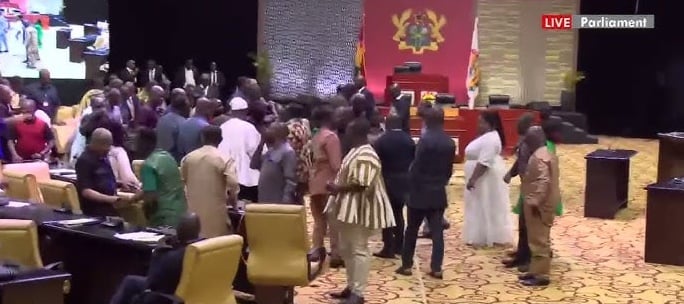As the Parliament of Ghana reconvened on Thursday morning at the Accra International Conference Centre, the session unfolded in an atmosphere marked by evident tension and frustration. By 8:30 a.m., only the Members of Parliament (MPs) from the National Democratic Congress (NDC) had arrived, taking their seats on the majority side typically reserved for the governing party, the New Patriotic Party (NPP). This early imbalance raised eyebrows and set the stage for an intense examination of party dynamics, commitment to parliamentary responsibilities, and the ongoing political strife within the house. The empty seats of the NPP MPs not only highlighted their absence but also symbolized a deeper malaise affecting Ghana’s legislative process at a critical juncture.
The dissatisfaction among the NDC MPs was palpable, as they expressed their frustration over the absence of their colleagues from the NPP. Joseph Bukari, the MP for Saboba, did not hesitate to voice his disappointment, asserting that the absence reflected a clear disregard for parliamentary duties. He criticized the NPP for their lack of seriousness during a crucial time when pressing national issues required urgent attention. His remarks resonated with the sentiments of other NDC members who felt that their presence in the chamber was not met with equal commitment from the NPP. They stressed that parliamentary business should not be delayed by the governing party’s lack of attendance.
Speaker Alban Bagbin had called back the parliament to address significant delays in legislative reforms and budgetary allocations. The absence of NPP members, especially at such an important session, caused NDC members to interpret it as a lack of commitment toward resolving national issues. They believed that while they were present trying to fulfill their obligations, the NPP’s absence was a setback that wasted time for both the parliamentarians and the Ghanaian public at large. The underlying message was that parliamentary engagements should take precedence, especially when important national matters were at stake.
As the morning progressed, the void left by the NPP MPs transformed from mere empty seats to a symbol of the broader power struggle between the NDC and NPP. The session reflected not just an operational disconnect but a deeper political rivalry that has characterized Ghana’s parliamentary history. The NDC’s presence was portrayed as a testament to their commitment to governance, while the NPP’s absence was a point of contention that added to the already high tensions circulating within the parliamentary walls. This episode served as a reminder of the challenges in fostering cooperation amidst political rivalry, particularly when national interest is under discussion.
This tension culminated in heightened scrutiny of both parties’ priorities, with the NDC accusing the NPP of playing politics at a critical moment when the nation needed collaborative efforts to tackle significant issues. The NDC MPs framed their attendance as a responsible act aimed at pushing through important legislative agendas, while the NPP’s choice to remain absent painted a contrasting picture of disengagement. As the day wore on, discussions among NDC members centered around the implications of the NPP’s absence, with calls for accountability and a renewed commitment to more substantial parliamentary engagement.
In conclusion, this early parliamentary session illuminated the fractures within Ghana’s political landscape, particularly the dysfunctional dynamics between the NDC and NPP. The absent NPP served as a litmus test for the parties’ respective commitment to governance and legislative responsibilities. The NDC’s readiness to work through important issues was set against the backdrop of the NPP’s apparent indifference, bringing to light the potential impacts on parliamentary efficiency and national governance. As both parties navigate through this atmosphere of tension, the focus will remain on how effectively they can collaborate to address the pressing issues that lie ahead, despite their ongoing rivalry.














